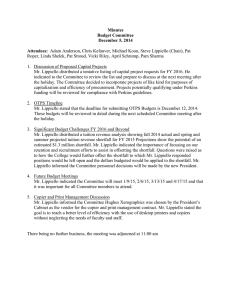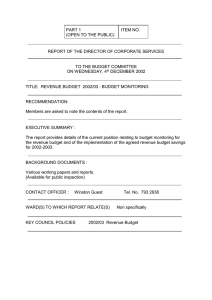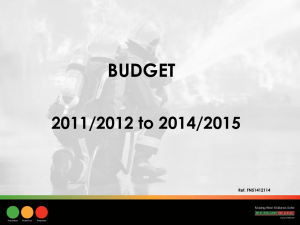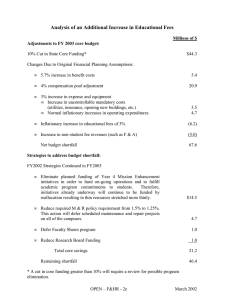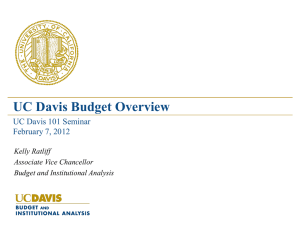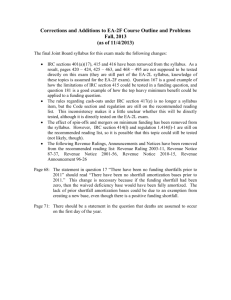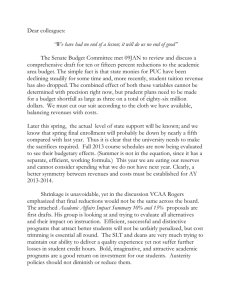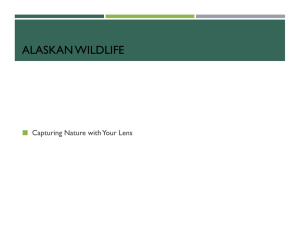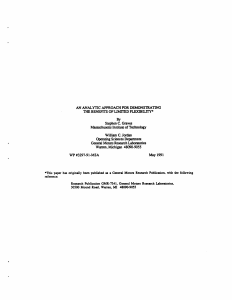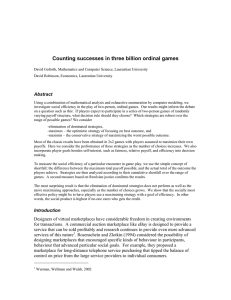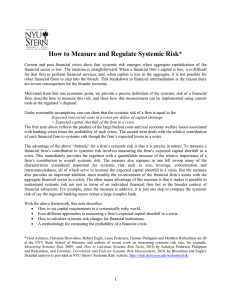Testing Your Risk Management Knowledge
advertisement
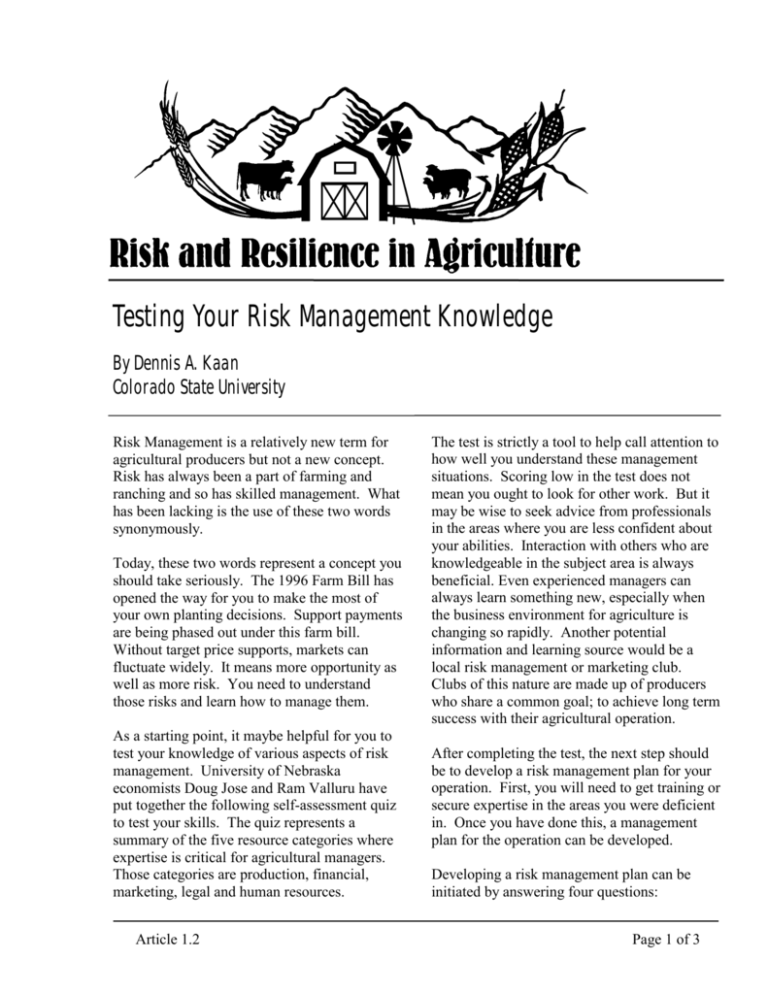
Testing Your Risk Management Knowledge By Dennis A. Kaan Colorado State University Risk Management is a relatively new term for agricultural producers but not a new concept. Risk has always been a part of farming and ranching and so has skilled management. What has been lacking is the use of these two words synonymously. Today, these two words represent a concept you should take seriously. The 1996 Farm Bill has opened the way for you to make the most of your own planting decisions. Support payments are being phased out under this farm bill. Without target price supports, markets can fluctuate widely. It means more opportunity as well as more risk. You need to understand those risks and learn how to manage them. As a starting point, it maybe helpful for you to test your knowledge of various aspects of risk management. University of Nebraska economists Doug Jose and Ram Valluru have put together the following self-assessment quiz to test your skills. The quiz represents a summary of the five resource categories where expertise is critical for agricultural managers. Those categories are production, financial, marketing, legal and human resources. Article 1.2 The test is strictly a tool to help call attention to how well you understand these management situations. Scoring low in the test does not mean you ought to look for other work. But it may be wise to seek advice from professionals in the areas where you are less confident about your abilities. Interaction with others who are knowledgeable in the subject area is always beneficial. Even experienced managers can always learn something new, especially when the business environment for agriculture is changing so rapidly. Another potential information and learning source would be a local risk management or marketing club. Clubs of this nature are made up of producers who share a common goal; to achieve long term success with their agricultural operation. After completing the test, the next step should be to develop a risk management plan for your operation. First, you will need to get training or secure expertise in the areas you were deficient in. Once you have done this, a management plan for the operation can be developed. Developing a risk management plan can be initiated by answering four questions: Page 1 of 3 1) What can cause a substantial income shortfall in my business? 2) How large might the shortfall be? 3) How much shortfall am I willing and able to bear? 4) How can I limit the shortfall to an acceptable level? What might cause a shortfall should get you thinking about risks that could seriously disrupt your business. There are two types of risk to consider. External risks are factors outside of the business over which you have little or no control. Internal risks are inside the business and include such things as high levels of financial or operating leverage. Physical and financial characteristics of your operation must be clearly understood to accurately and honestly identify internal risks. To answer, "How large might the shortfall be?" requires accurate production records for the business. You will also need to estimate the probability of lessor yield and price outcomes. The next step will be to combine yield and price estimates with cost of production data to determine the various net income levels. "How much shortfall can you bear?" relates to both your willingness and ability to bear risk. Your willingness to bear risk is a personal decision. Even though it is a personal decision, you need to communicate it to others in your management team. Your ability to bear risk is related to the liquidity and equity positions of the business. Remember that there is no set standard for these measures, they vary by type and size of operation. "How to limit the shortfall?" involves developing strategies to 1) limit the impact of an undesirable outcome and 2) improve the ability to withstand that impact. Developing these strategies requires knowledge of risk management tools and techniques. Page 2 of 3 Article 1.2 Risk Management Knowledge Test Q: When a new technology becomes available such as the global positioning system (GPS) or genetic engineered seed, do you analyze how it fits your situation? A. Always B. Mostly C. Sometimes D. Seldom Q: Have you identified and analyzed the potential new business opportunities like new crops and/or other farm enterprises that fit your situation? A. Completely B. Mostly C. Partially D. Not at all Q: Do you calculate your total production costs and break-even prices per unit of product produced each year? A. Always B. Mostly C. Sometimes D. Seldom Q: How many years in the past four did you include family budget and living expenses in your annual cash flow needs projections? A. At least three times B. Twice C. Once D. None To Figure Your Score: For each question, (a) = 4 points, (b) = 3 points, (c) = 2 points and (d) = 1 point. Number of questions for which your answer is (a) _____ x 4 = _____ Number of questions for which your answer is (b) _____ x 3 = _____ Number of questions for which your answer is (c) _____ x 2 = _____ Number of questions for which your answer is (d) _____ x 1 = _____ Total Score - What It Means? Between 50 and 60 - Excellent risk manager (Tip: You shouldn't have any surprises.) Between 40 and 50 - Good risk manager (Tip: You should be sleeping well at night.) Between 30 and 40 - Average risk manager (Tip: You might have some surprises.) Between 15 and 30 - Below average risk manager (Tip: You need to reconsider your strategies.) Article 1.2 Q: How many years in the past four were you able to meet your annual cash flow needs? A. At least three times B. Twice C. Once D. None Q: How many years in the past four did you complete an annual financial statement (net worth statement or balance sheet)? A. At least three times B. Twice C. Once D. None Q: How would you rate your understanding of various crop insurance products, coverage levels and their costs? A. Excellent B. Good C. Normal D. Poor Q: How would you rate your understanding of various marketing tools like futures and options? A. Excellent B. Good C. Normal D. Poor Q: How well do you understand your exposure to legal risks such as contract obligations and environmental liability? A. Excellent B. Good C. Normal D. Poor Q: How do you rate your people management skills in terms of job description, hiring, training, employer/employee relations and performance evaluation? A. Excellent B. Good C. Normal D. Poor Q: How do your rate knowledge and skills in the usage of computers and Internet? A. Excellent B. Good C. Normal D. Poor Q: How do you compare your overall farm financial situation with other similar farmers? A. Much better than average B. Slightly above average C. Above average D. Below average Q: How well are your business and family goals defined? A. Very well B. Well C. Moderately well D. Not defined Q: Are your goals measurable and attainable? A. Completely B. Mostly C. Partially D. Not at all Q: When you discuss your business plans with professionals who provide services and consulting to you, do you discuss your goals and risk preferences? A. Always B. Mostly C. Sometimes D. Seldom Page 3 of 3
